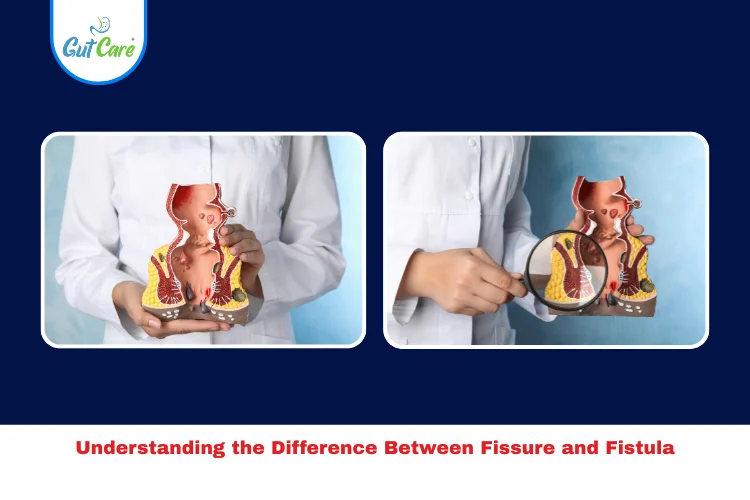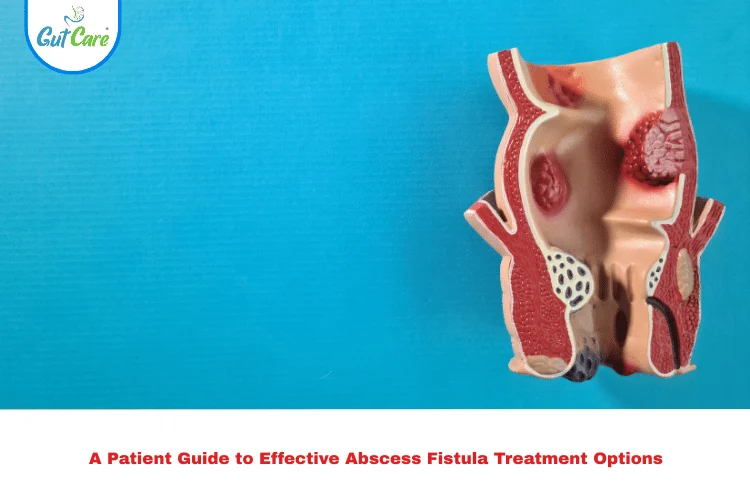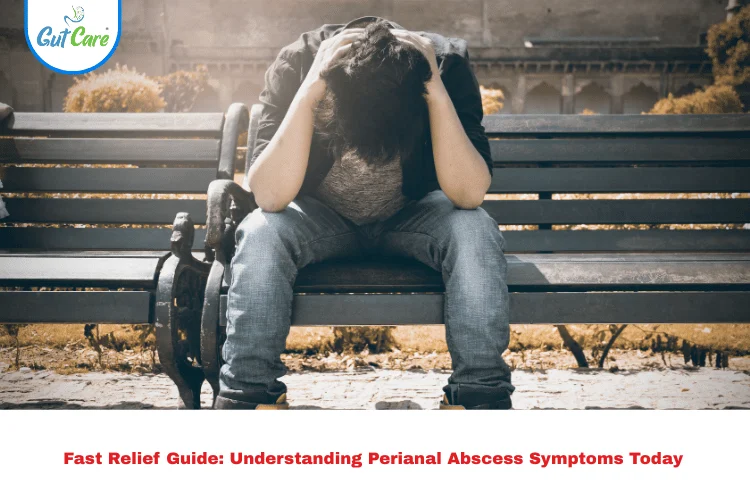If you’ve been experiencing discomfort or anal pain while passing stools, or finding blood, you might be thinking whether it’s a fissure or a fistula. Even with their apparent similarities, the difference between fissure and fistula is crucial for determining the right treatment. At GutCare Clinics, with expert care of Dr. Yuvaraj Singh Gehlot, a renowned fissure specialist , guarantees accurate diagnosis and personalized treatment plans to help you heal quicker.
A fissure is a tiny tear in the lining area of anal, caused by hard stools or constipation. A fistula, on the other hand, is a tunnel-like infection which is between the anus and the skin. Understanding the difference between fissure and fistula is important for effective care..
What is Fissure and Fistula?
Fissure
An anal fissure is a cut or tear in the lining of the anus. It often causes sharp pain during bowel movements and may be accompanied by bright red bleeding. Acute fissures typically heal with anal fissure ointment, stool softeners, and dietary changes. On our site, you might see fissure pictures or anal fissure images to understand what it looks like.
Common Causes:
- Passing hard stools
- Straining during bowel movements
- Chronic constipation or diarrhea
Fistula
A fistula is a small infected tunnel between the anal canal and the skin around the anus, usually resulting from an untreated abscess. Symptoms include persistent discharge or recurring abscesses. Fistulas require personalized treatment by a fistula specialist.
Fissure vs Fistula Symptoms
Symptoms of Fissure
- Sharp, burning pain during bowel movements
- Bright red bleeding from the anus
- Visible tear near the anal opening (see fissure images)
- Itching and discomfort
- Signs a fissure is healing: reduced pain or less bleeding
Symptoms of Fistula
- Persistent pus or bloody discharge
- Swelling, redness, and recurrent abscesses
- Fever if infection is present
Difference Between Fissure and Fistula at a Glance
| Feature | Fissure | Fistula |
| Cause | Tear due to trauma or hard stool | Infection from an abscess |
| Symptoms | Pain, bleeding, visible tear | Discharge, abscess, swelling |
| Healing | Ointments, sitz bath, diet, and creams | Typically requires surgical treatment |
| Recurrence | Possible, especially without treatment | Very likely if untreated |
| Treatment Approach | Conservative → surgical if needed | Surgical or laser intervention |
Treatment of Fissure and Fistula
Fissure Treatment
At GutCare Clinics, we provide:
- Best ointment for anal fissure
- Sitz baths to soothe the area
- High-fiber diet and anal fissure dietary fiber support
- Laser treatment for fissure or fissure operation for stubborn cases
- Guidance on how to treat anal fissure at home
- Evening out your daily routine to avoid strains
Fistula Treatment
Fistulas need more involved care:
- Fistulotomy or Seton placement
- Laser surgery for minimal recovery time
- Postoperative care tailored to reduce recurrence
- Both conditions benefit from proactive follow‑up care with Dr. Gehlot.
Both conditions benefit from proactive follow‑up care with Dr. Gehlot.
Can Fissure Turn Into Fistula?
A common query is, “Can fissure turn into fistula?” While they are distinct conditions—fissures from trauma and fistulas from infection—delaying care for either can lead to secondary complications. Both require early diagnosis from a fissure doctor or fistula specialist.
When to See a Fissure Specialist
Visit GutCare Clinics if you experience:
- Persistent or worsening pain
- Bleeding not improving with fissure ointment
- No improvement after home remedies
- Recurrent discharge or abscesses
Our experienced proctologist, Dr. YuvarajsinghGehlot, offers compassionate and thorough evaluation, including anoscopy or imaging if needed.
Final Thoughts
Understanding the difference between fissure and fistula is essential for effective treatment. Fissures often respond to topical creams and lifestyle changes, while fistulas need more advanced care. If you’re dealing with persistent symptoms, consult a fissure doctor or fistula specialist at GutCare Clinics today under Dr. Gehlot’s expert guidance.
FAQs
1. What is the best ointment for anal fissure?
GTN cream, lidocaine-based creams, and fissure treatment creams often help—consult your fissure specialist.
2. How do I treat anal fissure at home?
Use sitz baths, high-fiber diet, stool softeners, and topical fissure ointments to manage mild symptoms.
3. How long does fissure surgery recovery take?
Most patients recover in 1–2 weeks, but full healing may take 4–6 weeks, especially if laser treatment for fissure is used.
4. Do fistulas heal without surgery?
No—fistulas usually need surgical attention.




